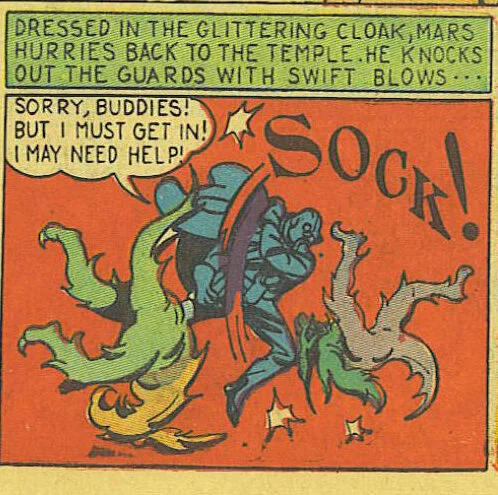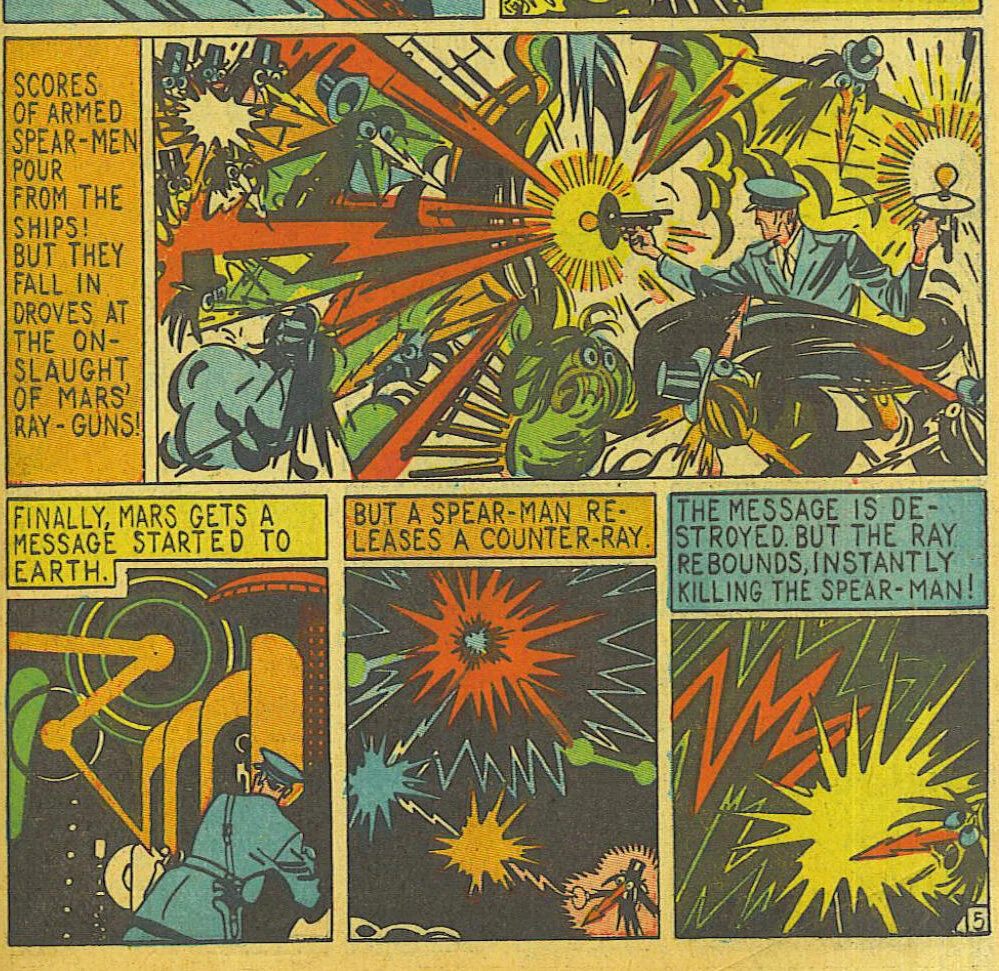Mars Mason (of the Interplanetary Mail Service)
Created by Munson Paddock
Appears in Speed Comics #7-11 (1940)
Neither rain, nor snow, nor gloom of night can stop the mail-carrier from their appointed rounds, according to the unofficial motto of the United States Postal Service. But the perils of parcel delivery among the perniciously populated planets of Earth’s solar system add a whole new Sears catalog of threats and impediments to the mix! When it absolutely has to be there overnight -- and by “there,” you mean “the embattled world of Neptune” -- call on the Interplanetary Mail Service and its top agent, Mars Mason!
An aside during an attack by alien monsters educates the readers as to the postal etiquette of the future.
The stoic Mason is the Interplanetary Mail Service’s premier officer, trusted with not only delivering mail from planet to planet in Earth’s solar system, but also defending precious cargo from alien aggression. On one occasion, while delivering a formula for a deadly explosive to the planet Mars (no relation), Mason is set upon by Jovian Needlemen and their deposed ruler Killraye, seeking the power to recover the throne. Later, while investigating an undelivered message in Earth’s stratosphere, Mason is trapped on the forest world of Greentrees and set upon by vicious Toughtails -- intent on burying him alive! He’s a key player in the terraforming of Uranus, routs a Soursnout rebellion on Venus, and on two different occasions rescues a long-tressed human beauty from alien menace.
All things being equal, it’s a lot more dangerous than the average route!
The breathless, dream-like storytelling of Mars Mason and its bold, lithographic line recalls the work of much-lauded outsider cartoonist Fletcher Hanks (“Stardust the Super-Wizard,” “Fantomah”), including the latter artist’s gory evocation of unbowdlerized fairy tales. But the strip’s strength is the bold, aggressive and almost overwhelming brushstroke with which the multitude of alien addresses and its residents are depicted.

Mad, beaked fiends wrap tangled streaks of ink-heavy limbs upon their victims. Ships descend from the skies like black darts. Deadly rays explode in black-bordered lightning bolts which terminate in clouds of broad paranthetical curves as thick as the reader’s thumbnail. To depict dramatic explosions and spirals of uncontained energy, ink-dipped panels are fractured by jagged hairline bolts of color. The result resembles the fractures of a broken pot repaired with gold.

A rescued prisoner ties her hair around the broken fin of Mars’ damaged ship, evoking fairy tale logic in a science fiction tale.
Geometric, graphical elements compose the backgrounds of dizzying space, and the arcs of spaceships as they travel through. Sound effects are rendered in typographic elegance -- a “BANG” erupts in a hand-drawn approximation of Cooper Black on a background of urgent red, in one early panel. The palette is relentless. Contrasting colors are slotted next to one another in such a way that some panels vibrate and, on a personal note, I have never seen a comic use as much as what I choose to call “bald-ass Magenta” as this one.
Mars Mason was created by Munson Paddock, a veteran illustrator who -- like Atomic Man’s Charles Voight -- came to comics in his forties, following an extensive career in magazines and newspapers. His previous original creations in this medium (“Mr.Bluff,” “Little Miss Thoughtful,” “Naughty Ned,” and others) were universally short-lived, but he nonetheless brought an uncommonly advanced sensibility and skillset to the earliest days of the Golden Age.
Originally creating pulp-style adventure material for National Allied, he made reluctant pokes at science fiction-style material in order to keep up with the drastically different post-superhero market -- under a variety of names. While the work in Mars Mason is demonstrably Paddock’s, the individual entries are attributed to only a small fraction of Paddock’s multitude of pen names -- Lyle Ford, Glen Ross, and Martin Nye.
(Paddock’s penchant for pen names has also managed to muddy the waters about his credits, to some degree. Having used his paternal grandmother’s maiden name, Cecelia Munson, as a credit earned him the accolade of later being erroneously listed among the luminaries in Trina Robbins’ essential A Century of Women Cartoonists)

Mars Mason in all of his explosive glory.
Mason was armed with a “Dyna-Ray” and a “space gun.” Either was capable of producing whatever effect he intended, from flying to blasting to sending and receiving messages. He also wasn’t alone in his battle against the evil alien residents of his solar system. In his final adventure, he rescues the raven-haired “Air Queen” from the temple of the savage letter-stealing Soursnouts, although their further adventures were never delivered.
Thanks to the Digital Comics Museum for scanning, uploading and making available these comics. Please visit and support Digital Comics Museum.
If you enjoyed this article and would like to contribute to more content like this on Gone&Forgotten, please consider supporting my Patreon.
You can find this post and others at Gone-And-Forgotten.com

No comments:
Post a Comment